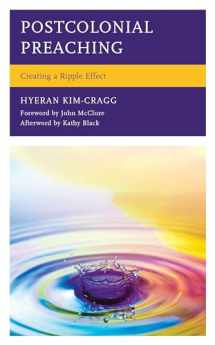
Postcolonial Preaching: Creating a Ripple Effect (Postcolonial and Decolonial Studies in Religion and Theology)
Book details
Summary
Description
Product Description
In Postcolonial Preaching, HyeRan Kim-Cragg argues that preaching is the act of dropping the stone of the Gospel into a lake, making waves to move hearts and transform the world wounded by colonial violence. The ripple effect serves as a metaphor and acronym to guide to preaching that takes postcolonial concerns seriously: Rehearsal, Imagination, Place, Pattern, Language and Exegesis (RIPPLE). Kim-Cragg explains each “ripple” in this approach and exercise of creating and delivering sermons. The author delivers fresh insights while drawing on some traditional homiletical perspectives in the service of a homiletic that takes the reality of racism, migration, and environmental degradation seriously. Moreover, Kim-Cragg demonstrates the postcolonial sermon in action by including annotated homilies. This book contributes to the very first wave of the application of postcolonial scholarship in preaching. Given the continuing extent and influence of colonial worldviews and legacies, this approach should become a staple in preaching over the next generation.
Review
The refugee camp on the island Moria in Greece was burning while I was reading the manuscript. Thousands of people were misplaced. The shameful failure of the European border regime was exposed anew. I take Kim-Cragg’s thoughtful and provocative proposal for a postcolonial perspective on preaching as a much needed contribution that takes these realities seriously.
How can we confront the winds of chauvinism in a meaningful way? How can our proclamation shape our imagination in radically eschatological ways? How do we deal constructively with (post)colonial realities that are surrounding us? How do we approach biblical texts by engaging in postcolonial contrapuntal reading? Deep homiletical reflections and inspiring sermons address these questions. -- Andrea Bieler, University of Basel
This pandemic has literally displaced preaching. Sermons are delivered via fiber optics on laptop screens instead of pulpits back lit by stained glass. Pews have been emptied, yet the hunger for hearing a living word deepens. Postcolonial Preaching frames the trauma of the loss of life, job, home, even memory, in the traveling mercies of the gospel. Backpack her insights as you travel with your community; learn how to make the journey home.
-- Heather Murray Elkins, Drew University, Professor of Worship, Preaching, and the Arts
A post-colonial world is coming to life even as tendrils of colonialism still have a grip on the present world. HyeRan Kim-Cragg offers important perspectives to help preachers empower coming of the new world while reducing the grip of the old. The author advocates a Ripple approach: rehearsing the new world, imagining a world beyond our immediate grasp, paying attention to colonial realities, patterning homiletical vessels for living water, learning language that is culturally respectful and diverse, and exegesis of the Bible in postcolonial perspective. Such preaching will, indeed, expand the postcolonial ripple in the church and beyond. -- Ronald J. Allen, Christian Theological Seminary, Professor of Preaching, Emeritus
Indeed, this book creates “a ripple effect” in the field of homiletics. The author invites readers to postcolonial struggles and critical reflection on the proclamation of the good news of God’s grace to our postcolonial world. The six homiletical principles—rehearsal, imagination, place, pattern, language, and exegesis—proposed from the multiple angles of the postcolonial perspective retool homiletical theories to be more effective for the practice of preaching in the postcolonial context.
-- Eunjoo Mary Kim, Iliff School of Theology
I was delighted to read in Postcolonial Preaching: Creating a Ripple Effect how HyeRan Kim-Cragg offers six essential elements for postcolonial preaching organized as widening circles instead of following the western logic of linear and hierarchical arrangement. As a pro


We would LOVE it if you could help us and other readers by reviewing the book
Book review



